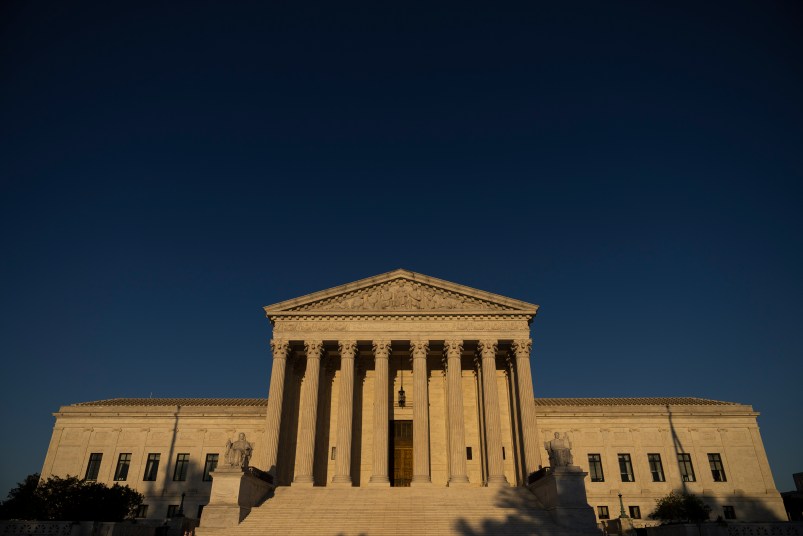The Texas abortion ban is likely headed for the Supreme Court — again.
On Thursday, the Department of Justice filed a lawsuit in Austin, asking that the law be invalidated under the 14th Amendment and the Supremacy Clause.
The law makes abortions after six weeks of pregnancy illegal, and deputizes individuals to file suit against anyone who “aids or abets” or intends to aid and abet the procedure.
The case was filed in district court in Texas from where it’ll most likely wend its way up to the Supreme Court. The conservative majority of the court let the abortion ban stand in an unsigned decision last week, though the justices emphasized that they were not ruling on the law’s merits.
The big question: who to sue?
While experts agree that the law is clearly unconstitutional, the abortion ban was specifically crafted to be impossible to enjoin preemptively.
“It violates both Roe and Casey, and the only reason it was allowed to go into effect is that it had this unusual, unorthodox and frankly devilish procedural posture where state absented itself from its enforcement,” NYU Law Professor Melissa Murray told TPM.
The DOJ listed the state of Texas as the sole defendant in its lawsuit. In their previous emergency motions, abortion providers had listed a whole suite of Texas officials, including a judge. The Supreme Court denied those motions, saying that the defendants listed were incorrect.
University of Michigan Law professor Leah Litman thinks the DOJ’s strategy should hold up before an unbiased court. She pointed to a 2012 case, Arizona v. United States, where the government sued the state of Arizona to enjoin a law.
“In that case, no one questioned whether the United States could sue a state and seek an injunction against a state law because it was so obvious that it could,” she said. “And the state of Texas, more than any other, has been suing the United States for injunction after injunction, trying to get various federal statutes enjoined — it simply can’t be that Texas can sue the United States for unconstitutional conduct, but the United States can’t sue Texas.”
Will the lawsuit work on the individual vigilantes?
The government is seeking two different kinds of relief, Litman said: one is an injunction against the state of Texas and its officers and entities, and the other is against those acting as agents of the state under this law.
Even if the DOJ didn’t win on the second part, she concluded, getting an injunction against the state would “stop the court from adjudicating cases and the clerks docketing them,” as the courts are among the agents of the state.
The enforcement scheme adds question marks
But this new ground being broken by the law — and thus, the lawsuit — is the x-factor in trying to handicap the proceedings.
That could mean a lot of things: that the state of Texas will likely lodge a series of procedural complaints about how the federal district court can’t rule on the law’s constitutionality; that the Supreme Court could reprise their original response to the law, and conclude that the enforcement scheme keeps them from intervening; that laws crafted to evade judicial review will likely become very widespread if this one is allowed to stand.
The courts could decide that the DOJ did everything right in response to the law’s bizarre enforcement scheme and engage on the merits. That’s not a slam dunk for those supporting abortion rights, though — if the conservatives on the high court intend to overturn Roe, that’ll give them their chance to do it.
What we know about the lawsuit’s journey
The lawsuit will start at district court with Judge Robert Pitman, the same judge who was overseeing the abortion providers’ initial lawsuit against the Texas abortion ban. Pitman, an Obama appointee, had scheduled a hearing for the abortion providers to make their case before the 5th Circuit swooped in and cancelled it.
Even if he’s inclined to sympathize with the government’s case, it likely won’t matter — a win at that level for the DOJ will quickly become a battle before likely unfriendlier courts, as the state of Texas would then appeal to the 5th Circuit.
“You might get a reasonable panel there, but the odds are against it,” Litman said.
From there, the lawsuit would likely be appealed to the Supreme Court where, clearly, the composition is on Texas’ side. In its original decision, the conservative contingent minus Chief Justice John Roberts let the law stand in a 5-4 vote.
Opportunities for SCOTUS to dismantle, or all-out void, abortion protections abound
The Supreme Court now has two major chances before it to weaken or nullify abortion protections. One is this lawsuit, which the Economist’s Supreme Court reporter surmised will reach the high court within the month.
The other is a 15-week abortion ban out of Mississippi, much more traditionally structured than the Texas ban, which the court will take up some time next term.







This either destroys the Republican Party or it destroys the Republic.
SCOTUS had better start being concerned with its reputation and legitimacy.
I’m just here to point out that there is plainly and obviously state action in this statute that can be enjoined. First of all, anybody bringing one of these suits is acting as an agent of the State of Texas by going to court to enforce the Texas law prohibiting post-“heartbeat” abortions. Second, the law strictly prohibits the state, any political subdivision, or any officer or employee of it from seeking to enforce the law, but then it immediately carves out an exception for anybody involved in enforcing the “civil” remedy provided by the statute. And who might that be? The Texas state courts, of course. They’re unquestionably state actors.
Here’s the relevant text:
I wonder who the four new SCJs will be in 2023?
They haven’t since Bush v. Gore.